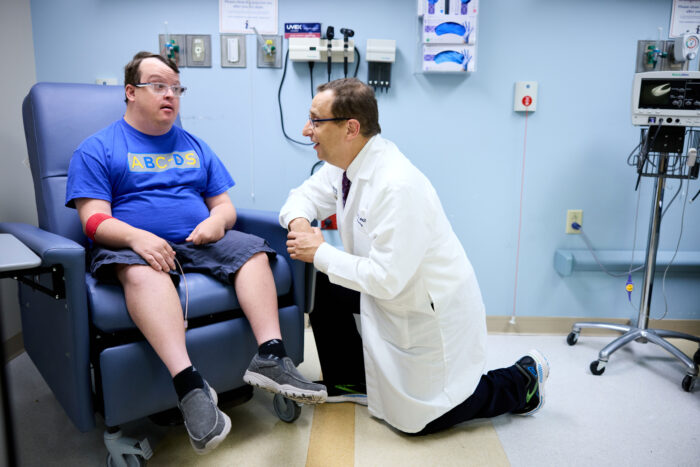Cognitive function in Down syndrome-associated Alzheimer’s focus of grant
NIH-supported study lays groundwork for Alzheimer’s clinical trials involving people with intellectual disabilities
 Matt Miller
Matt MillerNeurologist Beau Ances, MD, PhD, talks with his patient, Adam Kloppenberg, who has Down syndrome, at Washington University School of Medicine in St. Louis. People with Down syndrome are at very high risk of developing Alzheimer’s disease. Ances is involved in a project led by Jason Hassenstab, PhD, an associate professor of neurology, to develop tools to measure cognitive function in people with Down syndrome-associated Alzheimer’s disease.
Nearly every person with Down syndrome eventually develops Alzheimer’s disease, yet people with the syndrome routinely are excluded from Alzheimer’s clinical trials, as the cognitive assessment tools designed for the general population often are inappropriate for people with developmental disabilities. Consequently, nobody knows whether the new Alzheimer’s therapeutics hitting the market will work for people with Down syndrome. This puts this population at risk of missing out on potentially life-changing therapies.
Jason Hassenstab, PhD, an associate professor of neurology and of psychological & brain sciences at Washington University in St. Louis, is seeking to address this exclusion, with the help of an $11 million grant from the National Institute on Aging, part of the National Institutes of Health (NIH).
The grant will fund the Down Syndrome – Ambulatory Research in Cognition study, an international collaboration that aims to build and validate novel assessment technology for clinical trials of people with Down syndrome-associated Alzheimer’s disease.
“What we’re trying to do is build an outcome measure for clinical trials that can work in a population with varying levels of intellectual ability,” said Hassenstab, the principal investigator of the international study. “This is especially important for people with Down syndrome, since most are destined to develop Alzheimer’s, but we don’t have a good way of monitoring the clinical symptoms of the disease in this population. For example, many cognitive assessment tools depend on the ability to read and write. Not all people with Down syndrome can read and write.”
The first phase of research will involve developing a smartphone app designed to measure cognitive function in people with Down syndrome.
The app will randomly ping participants with the notification, “It’s time to play a memory game!” By tapping the notification, the participants will be whisked to a gamified smartphone-based cognitive test that will take three to five minutes to complete. The notification will come multiple times a day over the span of a week.
“It’s very hard to bring in everybody to be evaluated for Alzheimer’s disease,” said Beau Ances, MD, PhD, the Daniel J. Brennan, MD, Professor of Neurology and a professor of biomedical engineering and of radiology. “Some people don’t like taking tests; some can’t take tests at all. So, we have to evaluate in a new way. If you could take the test on your phone, we could get momentary assessments, free from the confounding factors you get in a lab.”
Using a smartphone app to sample cognition so frequently will ensure that participant cognition is tested in a variety of natural environments and emotional states. It also will assess the environment, stress and distractibility of participants immediately after testing sessions, guaranteeing that these factors are accounted for. The results from these different tests will then be averaged, and the subsequent score will capture a more accurate picture of the natural variability of cognition.
“We expect to see fluctuations,” Hassenstab said. “That’s normal, that’s how cognition works. We don’t capture that when we measure cognition in a single session with participants taking pencil-and-paper tests across from a person in a white lab coat. That little snippet of your cognitive functioning is assumed to represent how your cognition works throughout your entire life, but that’s just not true.”
The researchers will follow participants for three years in anticipation of launching clinical trials in people with Down syndrome-associated Alzheimer’s disease. The tools developed in the first years of the project will be evaluated for their utility at measuring changes in cognitive function over time. If the tools perform well, they could be used in clinical trials to determine the effectiveness of medications in slowing or preventing Alzheimer’s in people with Down syndrome.
Down syndrome is biologically characterized by an extra copy of chromosome 21, which houses the gene responsible for producing amyloid, one of two proteins responsible for driving Alzheimer’s development. This extra copy of the gene results in exorbitant amyloid production and is the reason why so many people with Down syndrome also develop Alzheimer’s disease.
“A lot of people in the community still don’t know that if you have Down syndrome, later on in life you have a very high risk of developing Alzheimer’s disease,” Ances said. “Developing functioning assessment measures for this population could help us start to conduct clinical trials in these populations. Finding better therapies for this community can translate to the larger community as well.”
The study’s international element makes it especially innovative, according to Hassenstab. It helps guarantee that a diverse population of participants will be included, and that any outcome measure can be used internationally. It also presents unique challenges in creating accurate assessment tools.
“Very few items exist in all places for all people, or if they do, they mean something quite different,” Hassenstab said. “For example, here in the U.S., bread means a leavened loaf baked in the oven. In some other places, bread means something flat and round and cooked on a pan, like a tortilla. Developing assessment tools that are valid across languages and cultures is challenging, but it is necessary if we are going to be able to help people of all backgrounds.”
The study includes six international sites: Washington University School of Medicine, King’s College London, Hospital Sant Pau in Barcelona, University of Gothenburg in Sweden, Ludwig Maximilian University of Munich, and Instituto Fleni in Buenos Aires.







